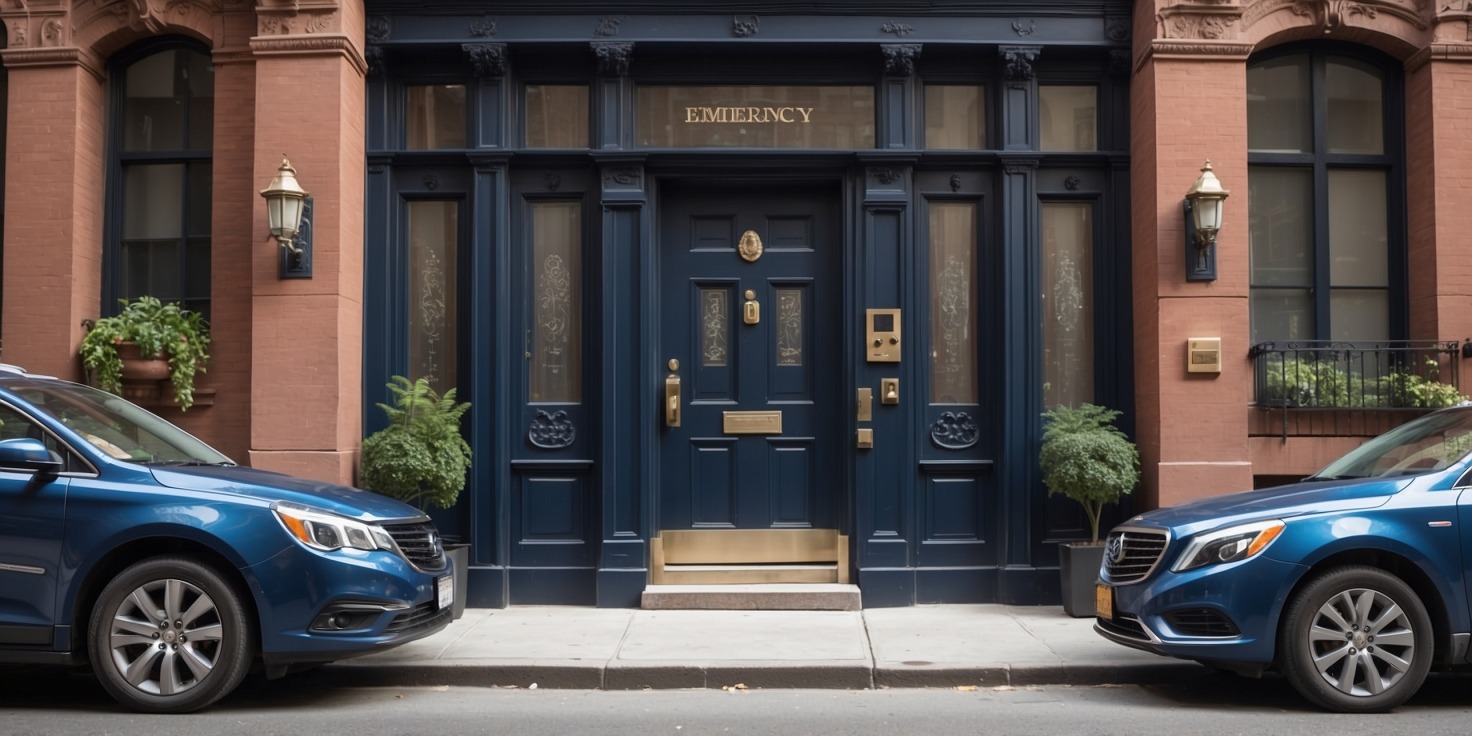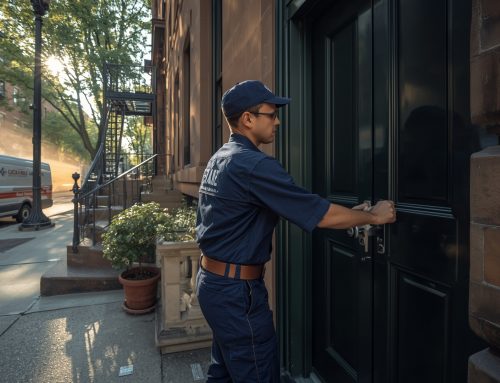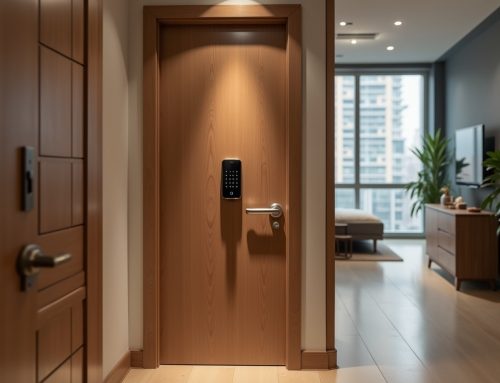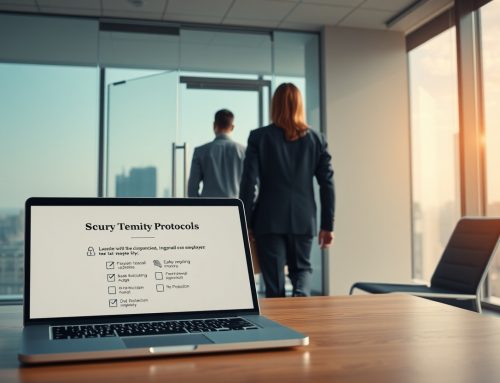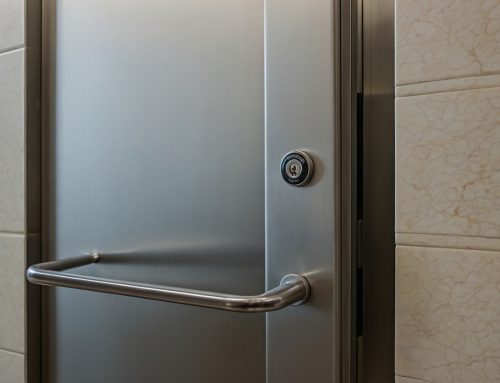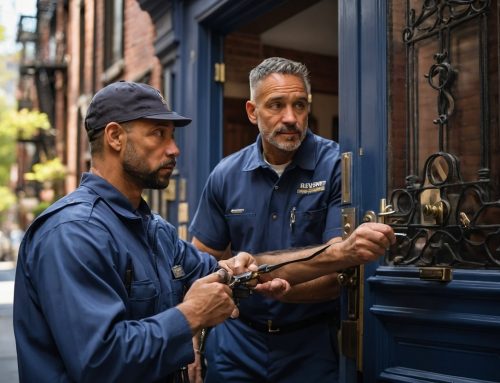Getting locked out of your apartment in New York City can be a frustrating and stressful experience, especially in a fast-paced environment where time is of the essence. Whether it’s due to lost keys, broken locks, or accidental door slams, lockouts are more common than you might think. Fortunately, there are practical steps you can take to prevent lockouts in NYC apartment buildings. At iLocksmiths, we understand the importance of security and convenience. With over 11 years of experience, our team provides reliable 24/7 locksmith services across New York City, specializing in residential, commercial, and automotive locksmith solutions. Our fast response time and dedication to customer satisfaction have made us a trusted name in the industry. In this guide, we’ll share expert tips and preventative measures to help you avoid apartment lockouts and maintain peace of mind in your daily routine. Whether you’re a tenant, property manager, or building owner, these insights will help you stay secure and prepared.
Understanding Common Causes of Apartment Lockouts
In a bustling city like New York, apartment lockouts are an all-too-common inconvenience that can disrupt your day and lead to unnecessary stress. Understanding the root causes of these lockouts is essential for developing effective strategies to prevent them. Whether you’re a tenant, landlord, or property manager, recognizing the most frequent reasons behind lockouts can help you take proactive measures to avoid them.
One of the most common causes of apartment lockouts is simply forgetting or misplacing keys. In the fast-paced environment of NYC, it’s easy to leave your keys inside your apartment or lose them during a busy commute. According to the American Apartment Owners Association, lost keys account for nearly 30 percent of all residential lockouts. This issue is especially prevalent in high-density areas like Brooklyn and Manhattan, where residents are constantly on the move.
Another frequent cause is malfunctioning locks or key systems. Over time, locks can wear out, become jammed, or fail due to poor maintenance. In older apartment buildings, especially those in neighborhoods like Park Slope or Ditmas, outdated locking mechanisms are more susceptible to failure. Regular maintenance and timely upgrades can significantly reduce the risk of being locked out due to hardware issues.
Electronic key fobs and smart locks, while convenient, can also be a source of lockouts. Battery failures, software glitches, or connectivity issues can prevent access, leaving residents stranded. As smart home technology becomes more prevalent in NYC apartments, especially in newer developments, understanding how to troubleshoot these systems is crucial.
Lockouts can also occur due to accidental door closures. Many NYC apartments are equipped with self-locking doors that automatically lock when closed. While this feature enhances security, it also increases the likelihood of being locked out if you step out without your keys. This is particularly common in neighborhoods like Brooklyn Heights, where older buildings often have these types of doors.
In some cases, lockouts are the result of tenant disputes or lease violations. Landlords may change locks due to non-payment of rent or other legal issues, although this must be done in accordance with New York City housing laws. Unauthorized lock changes can lead to legal complications and should always involve a professional residential locksmith to ensure compliance.
“According to the NYC Department of Housing Preservation and Development, landlords must provide tenants with a working lock and key and cannot lock out tenants without a court order.”
To illustrate the variety of scenarios that can lead to lockouts, consider the following examples:
- A tenant in Queens leaves for work in a hurry and forgets their keys inside. Upon returning, they realize the door has automatically locked behind them.
- A resident in a luxury Manhattan high-rise experiences a smart lock failure due to a dead battery, rendering their key fob useless.
- An elderly resident in Brighton Beach struggles with a worn-out lock that eventually jams, preventing them from entering their apartment.
Each of these situations highlights the importance of understanding the underlying causes of lockouts. By identifying these issues early, residents and property managers can implement preventative measures such as key duplication, regular lock maintenance, and the use of reliable smart lock systems.
For those who find themselves frequently dealing with lockouts, it may be time to consult with a professional. Services like iLocksmiths offer expert advice and 24/7 emergency assistance to help you regain access quickly and securely.
For more information on how to protect your home and avoid future lockouts, visit the NYC Housing Preservation and Development website at https://www.nyc.gov/site/hpd/index.page or explore our comprehensive residential locksmith services.
Understanding the common causes of apartment lockouts is the first step toward preventing them. With the right knowledge and support, NYC residents can enjoy greater peace of mind and uninterrupted access to their homes.
Key Management Tips for Tenants and Landlords
Effective key management is essential for both tenants and landlords in NYC apartment buildings to prevent frustrating and costly lockouts. In a city where fast-paced living is the norm, losing access to your apartment can disrupt your day and even compromise your safety. For tenants, the first step in avoiding lockouts is to establish a routine for handling keys. Always place your keys in the same location when at home and consider using a keychain that attaches to your bag or clothing when out. Many tenants also benefit from having a spare key stored in a secure location, such as with a trusted neighbor or friend who lives nearby. However, it’s crucial to ensure that this person is reliable and available when needed.
Landlords, on the other hand, should maintain a master key system that allows them to access all units in case of emergencies. This system should be kept secure and only accessible to authorized personnel. Additionally, landlords should clearly communicate their lockout policies to tenants upon move-in. This includes outlining any fees for after-hours lockout services and providing contact information for a trusted locksmith. Having a relationship with a professional residential locksmith can be invaluable for both parties. These experts can offer advice on secure key storage solutions and even install keyless entry systems that reduce the risk of lockouts altogether.
Digital solutions are also becoming increasingly popular in NYC apartment buildings. Smart locks and keyless entry systems allow tenants to access their apartments using a code or smartphone app. These systems can be especially helpful for households with multiple occupants or for tenants who frequently misplace their keys. Landlords can benefit from these systems by reducing the need for physical key duplication and simplifying access control. However, it’s important to choose a reliable system and ensure that all users are properly trained on how to use it.
Another important aspect of key management is regular maintenance and updates. Tenants should report any issues with locks or keys immediately to avoid being locked out due to a malfunction. Landlords should schedule periodic inspections of locks and entry systems to ensure they are functioning correctly. In buildings with high tenant turnover, it’s advisable to rekey locks between tenants to maintain security and prevent unauthorized access.
Communication between tenants and landlords is key to effective key management. Tenants should feel comfortable reaching out to their landlord or property manager if they are locked out or if they lose their keys. Landlords should respond promptly and have a clear protocol in place for handling such situations. Providing tenants with the contact details of a reliable locksmith, such as those available through iLocksmiths, can help resolve lockouts quickly and efficiently.
Finally, both tenants and landlords should consider the benefits of professional locksmith services. Whether it’s installing high-security locks, duplicating keys, or upgrading to a smart lock system, a professional locksmith can provide valuable guidance and support. In NYC, where security and convenience are top priorities, investing in professional key management solutions can save time, reduce stress, and enhance overall safety for everyone involved.
Installing Smart Locks and Keyless Entry Systems
One of the most effective ways to prevent lockouts in NYC apartment buildings is by upgrading to smart locks and keyless entry systems. These modern security solutions offer convenience, enhanced safety, and peace of mind for both tenants and property managers. Unlike traditional locks that rely on physical keys, smart locks use digital credentials such as PIN codes, mobile apps, or biometric data to grant access. This eliminates the risk of losing keys or locking them inside the apartment, a common issue in fast-paced urban environments like New York City.
Smart locks are particularly beneficial in multi-unit buildings where managing multiple keys can be cumbersome. Property managers can issue temporary or permanent digital access to tenants, maintenance staff, or delivery personnel without the need for physical key exchanges. This not only streamlines operations but also enhances security by allowing access to be revoked instantly if needed. For example, if a tenant moves out or a service provider no longer needs entry, their access can be deactivated remotely.
Another advantage of keyless entry systems is the ability to monitor access in real time. Many smart locks come with integrated activity logs that track who enters and exits the building and at what time. This feature is especially useful in buildings with high tenant turnover or shared spaces. It adds an extra layer of accountability and can deter unauthorized access, making the building safer for all residents.
In addition to improving security and convenience, smart locks can also be integrated with other smart home technologies. For instance, they can be connected to security cameras or alarm systems to provide a comprehensive security solution. This integration allows residents to see who is at the door before granting access, further reducing the risk of unauthorized entry. For those interested in enhancing their building’s overall security, exploring options like security cameras can be a valuable addition to a smart lock system.
Installing smart locks is also a cost-effective solution in the long run. While the initial investment may be higher than traditional locks, the reduction in lockout incidents, lost key replacements, and emergency locksmith services can lead to significant savings over time. Moreover, many smart locks are designed to be compatible with existing door hardware, making the upgrade process relatively straightforward.
For NYC residents and property managers looking to make the switch, working with a trusted local locksmith is essential. A professional can assess the building’s specific needs and recommend the most suitable smart lock systems. At iLocksmiths, we specialize in providing customized solutions for apartment buildings across the city. Whether you are in a historic brownstone in Brooklyn or a modern high-rise in Manhattan, our team can help you choose and install the right keyless entry system to prevent future lockouts.
Additionally, smart locks can be a valuable selling point for landlords and property managers. In a competitive rental market like New York City, offering high-tech amenities can attract quality tenants and justify premium rental rates. Tenants appreciate the convenience of not having to carry keys and the added security features that come with smart technology.
Ultimately, upgrading to smart locks and keyless entry systems is a proactive step toward preventing lockouts and enhancing the overall living experience in NYC apartment buildings. It reflects a commitment to modern living standards and ensures that residents feel secure and in control of their access. For more information or to schedule a consultation, feel free to contact our expert team today.
Creating a Backup Plan with Trusted Contacts
One of the most effective ways to prevent being locked out of your NYC apartment is by establishing a reliable backup plan involving trusted contacts. In a bustling city like New York, where schedules are hectic and unexpected situations arise frequently, having someone you can count on to help you regain access to your home can be a lifesaver. Start by identifying a few trustworthy individuals—such as close friends, family members, or even a dependable neighbor—who live nearby or have flexible availability. Provide them with a spare key and ensure they understand the importance of keeping it secure. This simple step can save you time, money, and stress in the event of a lockout.
When selecting someone to hold a spare key, consider their reliability and proximity. Ideally, this person should be someone who is often home or easy to reach in an emergency. It’s also wise to have more than one backup contact, especially if you live in a large apartment building or a neighborhood where access to your unit might be more complicated. For example, if your building has a doorman or security system, make sure your trusted contact knows how to navigate these features. This ensures they can assist you quickly without unnecessary delays.
Communication is key when creating a backup plan. Make sure your chosen contacts are aware of your schedule and any specific instructions related to your apartment. For instance, if your building requires a key fob or access code, ensure your contact has the necessary tools or information. Additionally, keep their contact information easily accessible—store it in your phone, wallet, or even with your building’s management if permitted. This way, you can reach out to them promptly if you find yourself locked out.
Another smart strategy is to coordinate with your building’s management or superintendent. Some buildings in NYC allow tenants to leave a spare key with the front desk or super for emergencies. If this is an option, take advantage of it, but always confirm the building’s policy and security measures. This can serve as an additional layer of protection, especially if your primary backup contact is unavailable.
For those who prefer a more tech-savvy approach, consider installing a smart lock system that allows remote access. These systems can be controlled via smartphone apps and often include features like temporary access codes for trusted individuals. While this may require an initial investment, it provides a modern solution to prevent lockouts and enhances overall home security. If you’re interested in upgrading your lock system, a professional residential locksmith can help you choose and install the right device for your needs.
In addition to having a backup keyholder, it’s beneficial to familiarize yourself with local locksmith services in your area. Knowing who to call in an emergency can make a significant difference. For instance, if you live in Brooklyn, you might want to explore services available in neighborhoods like Park Slope or Bay Ridge. Having a go-to locksmith ensures that even if your backup plan falls through, you have a reliable professional to assist you promptly.
Ultimately, creating a backup plan with trusted contacts is about being proactive and prepared. It’s a simple yet highly effective way to avoid the inconvenience and potential costs associated with being locked out of your apartment. By taking the time to establish a support system and exploring additional security options, you can enjoy greater peace of mind and ensure that help is always within reach when you need it most.
Working with a Reliable Locksmith in NYC
When it comes to preventing lockouts in NYC apartment buildings, one of the most effective strategies is establishing a relationship with a reliable locksmith. In a city as fast-paced and densely populated as New York, being locked out of your apartment can be more than just an inconvenience—it can disrupt your entire day or even pose a safety risk. A trustworthy locksmith not only provides emergency assistance but also helps you implement proactive measures to avoid future lockouts. By working with a professional who understands the unique challenges of urban living, you can ensure that your building’s security and accessibility are always a top priority.
A dependable locksmith offers more than just key duplication or emergency lockout services. They can assess your apartment building’s current security systems and recommend upgrades that enhance both safety and convenience. For instance, installing smart locks or keyless entry systems can significantly reduce the chances of tenants getting locked out. These modern solutions allow residents to use codes or mobile apps to gain access, eliminating the need for physical keys that can be lost or forgotten. A seasoned locksmith will guide you through the best options tailored to your building’s needs and budget.
Another benefit of working with a reliable locksmith is the peace of mind that comes from knowing help is just a phone call away. Whether it’s a tenant who’s misplaced their keys late at night or a broken lock that needs immediate attention, having a trusted professional on call ensures that issues are resolved quickly and efficiently. Many reputable locksmiths in NYC offer 24/7 emergency services, which is crucial in a city that never sleeps. This level of availability is especially important for property managers and landlords who are responsible for multiple units and tenants.
In addition to emergency services, a professional locksmith can provide regular maintenance and inspections of your building’s locks and entry systems. Over time, locks can wear out or become misaligned, increasing the risk of malfunction and potential lockouts. Routine check-ups help identify and address these issues before they become serious problems. This proactive approach not only enhances security but also extends the lifespan of your locking mechanisms, saving you money in the long run.
Choosing the right locksmith is essential. Look for a provider with a strong reputation, proper licensing, and a proven track record of serving NYC neighborhoods. Local expertise is invaluable, as it ensures the locksmith is familiar with the specific security challenges and building codes in your area. For example, if your apartment building is located in Brooklyn, you might consider a locksmith with experience in neighborhoods like Park Slope or Midwood. These professionals understand the architectural nuances and common lock systems used in these communities, allowing them to provide more effective and efficient service.
Furthermore, a reliable locksmith can assist with tenant turnover by rekeying locks or installing new hardware when residents move out. This not only helps prevent unauthorized access but also reassures new tenants that their safety is a priority. In buildings with high turnover rates, such as those catering to students or short-term renters, this service is particularly valuable.
Finally, working with a locksmith who offers comprehensive services can streamline your building’s security management. From installing high-security locks and access control systems to providing duplicate keys and emergency lockout assistance, a full-service provider becomes a one-stop solution for all your locksmith needs. This level of convenience and reliability is crucial for maintaining a secure and smoothly operating apartment building in NYC.
In conclusion, partnering with a reliable locksmith is a smart and necessary step in preventing lockouts in NYC apartment buildings. Their expertise, availability, and range of services not only help you respond to emergencies but also implement long-term solutions that enhance security and tenant satisfaction. By choosing a trusted local provider, you can ensure your building remains safe, accessible, and well-maintained for years to come.
Building Policies to Reduce Lockout Incidents
To effectively prevent lockouts in NYC apartment buildings, property managers and landlords must implement clear and proactive building policies. These policies not only reduce the frequency of lockout incidents but also enhance tenant satisfaction and building security. One of the most effective strategies is to establish a standardized key management system. This includes maintaining a secure master key system accessible only to authorized personnel and ensuring that tenants are informed about procedures for lost or misplaced keys. Additionally, offering digital access solutions such as key fobs or smart locks can significantly reduce the risk of lockouts, especially in high-traffic buildings where traditional keys are more likely to be lost or damaged.
Another essential policy is to provide tenants with clear guidelines during the lease signing process. This should include information on what to do in the event of a lockout, who to contact, and any associated fees. By setting expectations early, tenants are more likely to take precautions, such as keeping a spare key with a trusted neighbor or using a secure key storage option. Property managers should also consider partnering with a reliable local locksmith service for emergency lockout support. Having a trusted provider like iLocksmiths on call ensures that tenants can regain access quickly and safely without causing damage to property.
Regular maintenance and inspection of locks and entry systems are also crucial. Worn-out locks, faulty intercom systems, or malfunctioning keypads can all contribute to lockout situations. Building policies should include routine checks and prompt repairs to minimize these risks. Additionally, encouraging tenants to report any issues with their locks or keys immediately can help address problems before they lead to a lockout. For buildings with multiple units, installing a secure lockbox system for emergency access can be a practical solution. These lockboxes can be managed by building staff and used only under verified circumstances to maintain security.
Tenant education plays a vital role in reducing lockouts. Hosting periodic informational sessions or distributing newsletters with tips on avoiding lockouts can be beneficial. Topics might include the importance of checking for keys before leaving the apartment, using keychains or tracking devices, and understanding the building’s lockout policy. These efforts not only reduce incidents but also foster a sense of community and shared responsibility among residents.
Incorporating technology into building access policies can further enhance security and convenience. Smart locks and mobile access systems allow tenants to unlock doors using their smartphones, reducing reliance on physical keys. These systems can also provide property managers with access logs, helping to monitor building security more effectively. For buildings considering such upgrades, consulting with a professional locksmith service like iLocksmiths commercial locksmith can ensure proper installation and integration with existing security systems.
Finally, it’s important for building policies to be adaptable. As technology evolves and tenant needs change, policies should be reviewed and updated regularly. Gathering feedback from residents about their experiences and suggestions can help identify areas for improvement. By staying proactive and responsive, property managers can create a secure and efficient environment that minimizes lockouts and enhances tenant satisfaction.
Implementing these comprehensive building policies not only reduces the frequency of lockout incidents but also contributes to the overall safety and functionality of NYC apartment buildings. With the right combination of education, technology, and professional support, property managers can ensure that residents feel secure and well-supported in their homes. For more information or assistance with lockout prevention strategies, visit iLocksmiths contact page to speak with a qualified expert.
Educating Residents on Lockout Prevention Strategies
One of the most effective ways to prevent lockouts in NYC apartment buildings is by educating residents on proactive strategies and best practices. Many lockouts occur due to simple oversights, such as forgetting keys inside the apartment or misplacing them while out. By raising awareness and providing residents with practical tips, building managers and landlords can significantly reduce the frequency of these incidents. Start by encouraging residents to always double-check for their keys before leaving their apartment. This simple habit can be reinforced through signage in common areas like lobbies and elevators. Additionally, distributing a welcome packet or digital guide that includes lockout prevention tips can be especially helpful for new tenants. These materials can cover essential advice such as keeping a spare key with a trusted neighbor or friend, using a key holder or hook near the door, and considering smart lock systems that offer keyless entry options.
Another important aspect of resident education is promoting the use of professional locksmith services for key duplication and lock maintenance. Residents should be made aware of the risks associated with using unverified locksmiths or attempting DIY solutions that could damage the lock mechanism. Directing them to trusted providers like residential locksmith services ensures they receive reliable assistance when needed. Hosting occasional workshops or informational sessions in the building can also be a great way to engage residents and provide hands-on demonstrations of lock systems, key management, and emergency procedures. These sessions can be organized in collaboration with local locksmith professionals who can offer expert insights and answer questions.
In addition to individual habits, building-wide policies play a crucial role in lockout prevention. Property managers should implement clear protocols for handling lockouts, including designated emergency contacts and response times. Residents should be informed about these procedures during move-in and reminded periodically through newsletters or community boards. Encouraging the use of secure key storage solutions, such as lockboxes for emergency access, can also be beneficial. These should be managed by building staff and used only under verified circumstances to maintain security.
Technology can further enhance lockout prevention efforts. Many modern apartment buildings in NYC are adopting smart access systems that allow residents to unlock doors using their smartphones or access codes. These systems reduce the dependency on physical keys and minimize the chances of being locked out. Educating residents on how to use these technologies effectively, including keeping their devices charged and secure, is essential. For buildings not yet equipped with smart locks, property managers can explore options with professional locksmiths who specialize in upgrading traditional locks to more advanced systems. For example, residents in areas like Midwood or Bay Ridge can benefit from services provided by iLocksmiths Midwood and iLocksmiths Bay Ridge.
Ultimately, fostering a culture of awareness and responsibility among residents is key to minimizing lockouts. By combining practical advice, professional support, and modern technology, NYC apartment buildings can create a more secure and convenient living environment. Regular communication, accessible resources, and a proactive approach to lockout education will not only reduce the number of incidents but also enhance overall resident satisfaction and safety.
In conclusion, preventing lockouts in NYC apartment buildings requires a combination of proactive planning, smart technology, and clear communication. By adopting strategies such as duplicating keys, using keyless entry systems, maintaining updated contact information with building management, and educating residents on best practices, both tenants and property managers can significantly reduce the risk of being locked out. In a fast-paced city like New York, where time is valuable and convenience is key, taking these preventative measures ensures smoother daily living and greater peace of mind for everyone involved.

